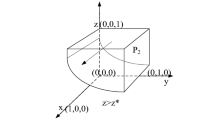Abstract
Considering the bargaining power of enterprises, this paper distinguishes between “Offering Bribes Voluntarily” (OBV) and “Offering Bribes under Pressure from Environmental Inspectors” (NOBV). An evolutionary game model between environmental inspectors and enterprises is constructed to study the corruption of environmental inspectors in the process of environmental tax collection under the system of upward accountability. At the same time, numerical simulations are carried out using China’s pollution discharge data and pollution discharge fee collection standards in 2017. The results show that when enterprises have different bargaining powers, there are differences in the evolutionary stable strategy (ESS) in the process of environmental tax collection. Enterprises with weak bargaining power may adopt “OBV” strategy. Under the system of upward accountability, it is difficult for the public to form adequate supervision over polluting enterprises and environmental inspectors. Only with the power of the upper-level government can the public’s supervisory role be brought into play. High audit costs and environmental tax rates may be objective incentives for environmental inspectors’ corruption and enterprises’ bribery.




Similar content being viewed by others
Data Availability
All data generated or analyzed during this study are included in this published article (and its supplementary information files).
References
Benchekroun H, Chaudhuri RA (2011) Environmental policy and stable collusion: the case of a dynamic polluting oligopoly. J Econ Dyn Control 35(4):479–490
Cerqueti R, Coppier R (2016) Corruption, evasion and environmental policy: a game theory approach. IMA J Manag Math 27(2):235–253
Chen SH (2017) An evolutionary game study of an ecological industry chain based on multi-agent simulation: a case study of the poyang lake eco-economic zone. Sustainability 9(7):1165
Chen X, Chang CP (2020) Fiscal decentralization, environmental regulation, and pollution: a spatial investigation. Environ Sci Pollut Res Int 27(25):31946–31968
Chen Z, Kahn ME, Liu Y, Wang Z (2018) The consequences of spatially differentiated water pollution regulation in China. J Environ Econ Manag 88:468–485
Chien SS (2010) Economic freedom and political control in Post-Mao China: a perspective of upward accountability and asymmetric decentralization. Asian J Polit Sci 18:69–89
Cole MA (2007) Corruption, income and the environment: an empirical analysis. Ecol Econ 62(3-4):637–647
Cole MA, Elliott RJR, Shimamoto K (2005) Industrial characteristics, environmental regulations and air pollution: an analysis of the UK manufacturing sector. J Environ Econ Manag 50(1):121–143
Greenstone M, Hanna R (2014) Environmental regulations, air and water pollution, and infant mortality in India. Am Econ Rev 104(10):3038–3072
Halkos GE, Papageorgiou GJ (2018) Pollution, environmental taxes and public debt: a game theory setup. Econ Anal Pol 58:111–120
Ivanova K (2011) Corruption and air pollution in Europe. Oxf Econ Pap 63(1):49–70
Jia K, Chen S (2019) Could campaign-style enforcement improve environmental performance? Evidence from China’s central environmental protection inspection. J Environ Manag 245:282–290
Leitão A (2010) Corruption and the environmental Kuznets curve: empirical evidence for sulfur. Ecol Econ 69(11):2191–2201
Li R, Zhou Y, Bi J, Liu M, Li S (2020) Does the Central Environmental Inspection actually work? J Environ Manag 253:109602
Lopez R, Mitra S (2000) Corruption, pollution, and the Kuznets environment curve. J Environ Econ Manag 40(2):137–150
Qian Y, Roland G (1998) Federalism and the soft budget constraint. Am Econ Rev 88(5):1143–1162
Wang ZX (2015) A predictive analysis of clean energy consumption, economic growth and environmental regulation in China using an optimized grey dynamic model. Comput Econ 46(3):437–453
Wang H, Liu H (2019) Foreign direct investment, environmental regulation, and environmental pollution: an empirical study based on threshold effects for different Chinese regions. Environ Sci Pollut Res Int 26(6):5394–5409
Wang C, Shi F (2019) An evolutionary game model for industrial pollution management under two punishment mechanisms. Int J Environ Res Public Health 16(15):2775
Wang S, Yuan Y, Wang H (2019) Corruption, hidden economy and environmental pollution: a spatial econometric analysis based on China’s provincial panel data. Int J Environ Res Public Health 16(16):2871
Xi PH (2017) Fiscal incentives, environmental preference and the horizontal environmental management: from the perspective of barganing power of major taxpayers. Chin Ind Econ 34(11):100–117 (in Chinese)
Yeung D (1992) A differential game of industrial pollution management. Ann Oper Res 34(1):297–311
Zhang H, Tu G (2019) Evolutionary analysis of enterprise’s environmental strategy considering stealth discharge: from the perspective of environmental tax reduction policy. J Beijing Insti Technol(Social Sciences Edition) 21:21–28 (in Chinese)
Zhang Z, Jin T, Meng X (2020) From race-to-the-bottom to strategic imitation: how does political competition impact the environmental enforcement of local governments in China? Environ Sci Pollut Res Int 27(20):25675–25688
Funding
This study is funded by the National Ministry of Education Humanities and Social Science Research Planning Fund Project 18YJA790031. In the writing process, the fund provides financial support for our exchanges with related scholars and software learning.
Author information
Authors and Affiliations
Contributions
Conceptualization, Po Kou; Writing—original draft, Po Kou; Methodology, Po Kou and Ying Han; Formal analysis and investigation, Po Kou and Ying Han; Funding acquisition, Ying Han; Software, Yuanxian Li.
Corresponding author
Ethics declarations
Ethics approval and consent to participate
Not applicable
Consent for publication
Not applicable
Competing interests
The authors declare no competing interests.
Additional information
Responsible Editor: Nicholas Apergis
Publisher’s note
Springer Nature remains neutral with regard to jurisdictional claims in published maps and institutional affiliations.
Rights and permissions
About this article
Cite this article
Kou, P., Han, Y. & Li, Y. An evolutionary analysis of corruption in the process of collecting environmental tax in China. Environ Sci Pollut Res 28, 54852–54862 (2021). https://doi.org/10.1007/s11356-021-13104-4
Received:
Accepted:
Published:
Issue Date:
DOI: https://doi.org/10.1007/s11356-021-13104-4




